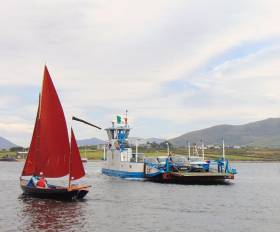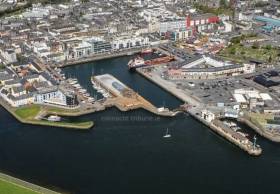Displaying items by tag: Shane Ross
#NewFerry - The future of the Valentia Island ferry in Co Kerry remains in doubt as God Met Ons III dating to 1963, easily the country’s oldest domestic ferry, will no longer meets marine safety requirements, writes Jehan Ashmore.
The seasonal service linking Reenard Point on the mainland to Knightstown on Valentia, last year handled an impressive 250,000 passengers and 100,000 cars. The traffic handled by the 15 car capacity ferry on the crossing takes just five minutes to complete.
Commenting to Afloat, Richard Foran of Valentia Island Ferries cited costs to avoid decommissioning the ageing ferry with modification works would be too expensive. This compared to a replacement ferry in the region of €3 million.
Mr. Foran added that they have already consulted a naval architect on the Isle of Wight for designs of a custom-built but larger 18 car capacity ferry. In addition the new ferry would be capable of transporting large coaches unlike the current ferry. He also added to Afloat that they are looking at an Irish yard to build the new ferry.
Islanders say that without a ferry replacement funded by the Irish Government, the tourism sector would collapse. The €3 million figure is beyond the reach of the island community from which five families established Valentia Island Ferries in 1996, however the operator said they can only contribute €1 million towards the cost of the newbuild.
The Minister for Transport, Tourism and Sport, Shane Ross and local independent T.D. Michael Healy Rae last month travelled to Valentia to meet the board of directors of Valentia Island Ferries to discuss possible funding of the new ferry. The ferry firm had previously applied to Fáilte Ireland for €2 million but this failed. Should the newbuild be granted state funding it would be built in time for the 2018 season
Originally, God Met Ons III ran for Dutch owners on the River Maas, but was sold to Valentia Island Ferries to operate the island’s first ever car-ferry service. Previously there had been a cargo boat service on the same route until a bridge was constructed in 1970, towards the west of the island linking Portmagee on the mainland.
Despite the bridge, islanders and tourist alike benefit from the ferry service that reduces 13 miles the distance to Cahersiveen, the nearest large mainland town.
The loop created by both bridge and ferry has been a boost to tourism in recent years since the launch of the Wild Atlantic Way that includes the Skelligs.
Downgrade By Minister May Blow Galway Port Plan Out of the Water
#Downgrade - A move by the Minister for Transport Shane Ross to downgrade Galway Port by signing a ministerial order could signal the death knell for the multimillion euro harbour development – and the entire expansion of the city to the sea.
As The Conncht Tribune writes, Galway City Councillors recently voted unanimously on a proposal calling on Minister Ross not to change Galway Port’s status from a national port to a port of regional significance.
Former government minister Éamon Ó Cuív is adamant that unless Galway remains a top tier port, it could join a long list of infrastructural projects that have been scuppered in the west due to planning difficulties.
The 2013 National Ports Policy stated that Galway Port should be downgraded from a national port to a port of regional significance.
For more on the report, click here.

























































